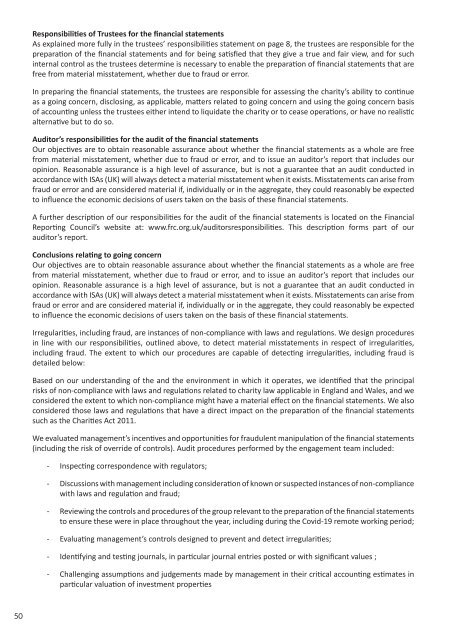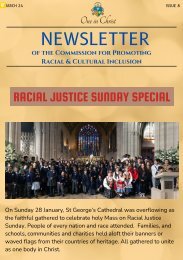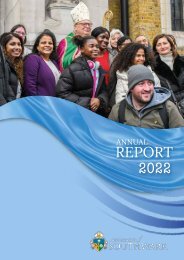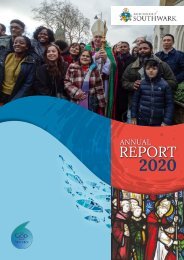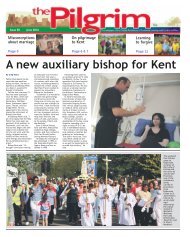Create successful ePaper yourself
Turn your PDF publications into a flip-book with our unique Google optimized e-Paper software.
Responsibilities of Trustees for the financial statements<br />
As explained more fully in the trustees’ responsibilities statement on page 8, the trustees are responsible for the<br />
preparation of the financial statements and for being satisfied that they give a true and fair view, and for such<br />
internal control as the trustees determine is necessary to enable the preparation of financial statements that are<br />
free from material misstatement, whether due to fraud or error.<br />
In preparing the financial statements, the trustees are responsible for assessing the charity’s ability to continue<br />
as a going concern, disclosing, as applicable, matters related to going concern and using the going concern basis<br />
of accounting unless the trustees either intend to liquidate the charity or to cease operations, or have no realistic<br />
alternative but to do so.<br />
Auditor’s responsibilities for the audit of the financial statements<br />
Our objectives are to obtain reasonable assurance about whether the financial statements as a whole are free<br />
from material misstatement, whether due to fraud or error, and to issue an auditor’s report that includes our<br />
opinion. Reasonable assurance is a high level of assurance, but is not a guarantee that an audit conducted in<br />
accordance with ISAs (UK) will always detect a material misstatement when it exists. Misstatements can arise from<br />
fraud or error and are considered material if, individually or in the aggregate, they could reasonably be expected<br />
to influence the economic decisions of users taken on the basis of these financial statements.<br />
A further description of our responsibilities for the audit of the financial statements is located on the Financial<br />
<strong>Report</strong>ing Council’s website at: www.frc.org.uk/auditorsresponsibilities. This description forms part of our<br />
auditor’s report.<br />
Conclusions relating to going concern<br />
Our objectives are to obtain reasonable assurance about whether the financial statements as a whole are free<br />
from material misstatement, whether due to fraud or error, and to issue an auditor’s report that includes our<br />
opinion. Reasonable assurance is a high level of assurance, but is not a guarantee that an audit conducted in<br />
accordance with ISAs (UK) will always detect a material misstatement when it exists. Misstatements can arise from<br />
fraud or error and are considered material if, individually or in the aggregate, they could reasonably be expected<br />
to influence the economic decisions of users taken on the basis of these financial statements.<br />
Irregularities, including fraud, are instances of non-compliance with laws and regulations. We design procedures<br />
in line with our responsibilities, outlined above, to detect material misstatements in respect of irregularities,<br />
including fraud. The extent to which our procedures are capable of detecting irregularities, including fraud is<br />
detailed below:<br />
Based on our understanding of the and the environment in which it operates, we identified that the principal<br />
risks of non-compliance with laws and regulations related to charity law applicable in England and Wales, and we<br />
considered the extent to which non-compliance might have a material effect on the financial statements. We also<br />
considered those laws and regulations that have a direct impact on the preparation of the financial statements<br />
such as the Charities Act 2011.<br />
We evaluated management’s incentives and opportunities for fraudulent manipulation of the financial statements<br />
(including the risk of override of controls). Audit procedures performed by the engagement team included:<br />
- Inspecting correspondence with regulators;<br />
- Discussions with management including consideration of known or suspected instances of non-compliance<br />
with laws and regulation and fraud;<br />
- Reviewing the controls and procedures of the group relevant to the preparation of the financial statements<br />
to ensure these were in place throughout the year, including during the Covid-19 remote working period;<br />
- Evaluating management’s controls designed to prevent and detect irregularities;<br />
- Identifying and testing journals, in particular journal entries posted or with significant values ;<br />
- Challenging assumptions and judgements made by management in their critical accounting estimates in<br />
particular valuation of investment properties<br />
50


